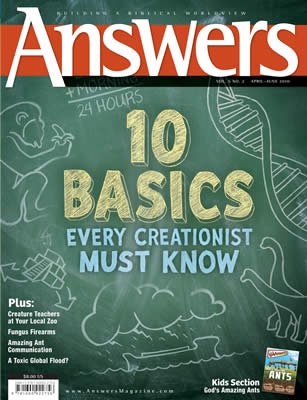
Variety Within Created Kinds
Did all species evolve from one common ancestor? Genesis 1 repeats ten times that God created creatures separately according to various “kinds.” Today’s species show the potential variation that God designed within the original kinds, but this variety remains limited—cats are still cats, and dogs are dogs.
Our world is filled with a tremendous variety of life. And its origin is no mystery. The Bible says God created every kind of living thing on Days Three, Five, and Six of Creation Week. Ten times in Genesis 1 the phrase “according to its [or their] kind” is used in connection with different types of plants and animals. The word kind is used again in Genesis 6 when God instructed Noah to take two of every kind of land animal onto the Ark; and in Genesis 8 God commanded these animals to reproduce after the Flood.
What does the word kind mean?
Since two of each kind of land animal (and seven of some) were brought aboard the Ark for the purpose of preserving their offspring upon the earth (Genesis 7:3), it seems clear that a “kind” represents the basic reproductive boundary of an organism. That is, the offspring of an organism is always the same kind as its parents, even though it may display considerable variation.
Dogs, for example, exhibit tremendous variety. Yet diverse breeds of dogs can produce offspring with each other—indicating that all dogs are of the same kind. Dogs will not interbreed with cats, however, since they are a different kind. Modern breeding research therefore confirms the biblical concept of animal and plant kinds.
“God made everything . . . according to its kind” Genesis 1:25
Creation researchers have found that “kind” is often at the level of “family” in our modern classification scheme. For example, zebras, horses, and donkeys all belong to the family Equidae and can mate with each other to form hybrid animals such as mules (from a horse and donkey) and zonkeys (from a zebra and donkey). However, there is no reason to assume a one-to-one correspondence between our manmade system and the biblical terminology. So “kind” may be at a higher taxonomic level in some cases, lower in others.
God placed the potential for tremendous variety within the original created kinds. This original variation, altered by genetic mutations and other mechanisms after the Fall (such as natural selection), led to the great diversity of living things we see today.
A modern field of study, called baraminology (from the two Hebrew words bara, meaning “created,” and min, meaning “kind”), attempts to classify fossil and living organisms into their original created kinds (or baramins). This is an active area of creation research. As creation scientists, we are not ashamed to stand on the foundation of God’s Word for our research and understanding of living things.

“According To Its Kind” According to Genesis 1, God made each type of creature “according to its kind.” Within their DNA, God placed the potential for tremendous variety, including new species. But every species belongs to its original kind—cats are still cats, and dogs are dogs.
For Additional Information
Related Videos
Elephant Design
Answers Magazine
April – June 2010
Debates about evolution and attacks on Scripture seem endless. But why should we be ashamed of truth? In this issue you’ll find basic truths revealed in Genesis and confirmed by science—bare-bones essentials that all Christians need. Also look for fascinating science news, ideas for a faith-building creation “stay-cation” to your local zoo, and semi-technical articles to strengthen your faith and challenge your mind!
Browse Issue SubscribeRecommended Resources

Answers in Genesis is an apologetics ministry, dedicated to helping Christians defend their faith and proclaim the good news of Jesus Christ.
- Customer Service 800.778.3390
- © 2024 Answers in Genesis




